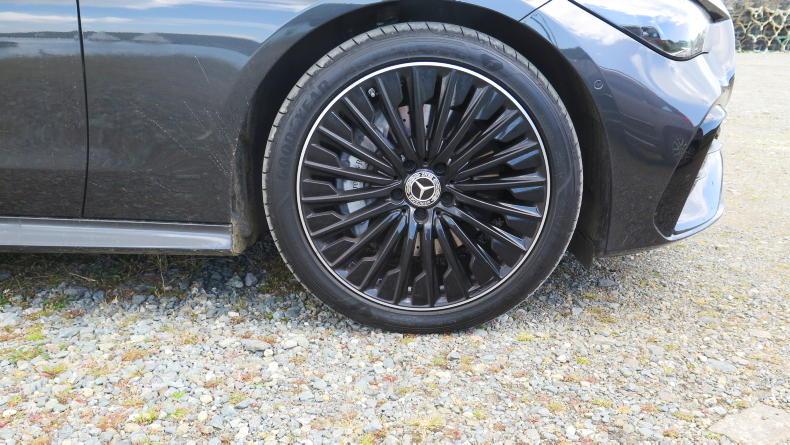Mercedes-Benz is regarded as a brand of quality and sometimes we can have more regard for what a brand stands for than what it delivers.
The latest Mercedes-Benz hybrid cars deliver where it counts – economy that converts to low running costs and also low emissions. These high economy levels challenge the view that only electric power can be the cleanest. The painful part, however, is the entry price.
For many motorists, the ultimate aspiration is to own a Mercedes-Benz.
My most recent experience driving the hybrid versions of the German brand’s diesel and petrol hybrid cars would reinforce such ambitions.
In both cases, the cars delivered an engineering triumph – smooth driving and great comfort topped off with huge economy levels. Why wouldn’t we all want to drive one?
One of the cars I road-tested was the new CLE 220 D coupé, where it was almost impossible to empty the 66-litre capacity diesel tank.
Claims about fuel economy are one thing, but the reality is often much different.

The test Mercedes-Benz CLE 220D car came shod on Goodyear 245/40 R19 that added to the smooth and almost silent driving experience.
Not so in the case of this Mercedes-Benz where after driving 878km, there was still fuel enough for a further 643km. That means a range of over 1500km on a full tank! There is simply no beating that, making me ponder if this was enough to make me consider remortgaging the house!
Engineering feat
The car’s computer claimed that it would deliver this performance and, initially, I took that with a small grain of salt. I was wrong; kilometre after kilometre this car continued to deliver, and it is clearly an engineering feat that must be lauded. And because it’s so good in terms of engine economy, and your personal economy, that clearly makes it good for the planet.
This achievement is down to a lightweight car, that’s powered by a clean mild hybrid, 1.9 turbo-diesel engine matched to an incredible 9-speed automatic gearbox. Incredible, because it allows you to cruise on the motorway at 120km/hr with the engine ticking over at just about 1300rpm. Driving becomes calm, serene and very satisfying with the potential to be very fast.

The new Mercedes-Benz CLE 220D offers outstanding economy powered by a modern and clean turbo-diesel engine. This car claims and delivers a range of over 1,500km, while entry prices are relatively high at €73,215 or £55,060 in N. Ireland..
The engineering part of the Mercedes-Benz CLE 220 D coupé is the aspect that’s often overlooked given the glitz of modern car styling. This car has an impressive engine torque at 440Nm. It’s that high torque that allows the 9-speed gearbox to achieve such economy. If only all diesel engine cars could be designed to achieve this?
I know that many of you will look at this car and point to its lack of affordability. And as a coupé it may not be wholly practical, but what it shows is that Mercedes-Benz can offer the same power and economy in a more spacious saloon E-Class.
Forget about the external image of the car and the lack of space in the rear; what’s important to understand is that Mercedes-Benz has designed and
engineered a diesel engine-based drive system for its cars that’s clearly exceptional. There are a lot of technical and safety features in the car, plus a host of Mercedes-Benz software systems to enhance the driving experience.
Intuitive steering system
The latest MBUX system has voice or touch input options in a very modern infotainment system that can over time even predict personal habits thanks to artificial intelligence. Managing the steering wheel control systems takes a little learning, and I found that it quickly became intuitive.
My total driving experience was primarily wooed by the engineering excellence – this delivers impressive economy matched with low emissions that combine to give very affordable running costs of €0.40/km. If you could step up to the price, the three-year ownership costs become clearly affordable. The entry price is €73,215 or £55,060 in N. Ireland, which is a massive jump for older car owners, but may be as affordable as other options in a trade-in situation. And this car will last as long as diesel fuel will be available at the pumps.
The running costs are comparable with smaller cars at €0.40 per kilometre (see table), in terms of depreciation and cost per kilometre driven, the challenge is getting to that price level, not staying there because these cars are holding their
values.
Mercedes-Benz is regarded as a brand of quality and sometimes we can have more regard for what a brand stands for than what it delivers.
The latest Mercedes-Benz hybrid cars deliver where it counts – economy that converts to low running costs and also low emissions. These high economy levels challenge the view that only electric power can be the cleanest. The painful part, however, is the entry price.
For many motorists, the ultimate aspiration is to own a Mercedes-Benz.
My most recent experience driving the hybrid versions of the German brand’s diesel and petrol hybrid cars would reinforce such ambitions.
In both cases, the cars delivered an engineering triumph – smooth driving and great comfort topped off with huge economy levels. Why wouldn’t we all want to drive one?
One of the cars I road-tested was the new CLE 220 D coupé, where it was almost impossible to empty the 66-litre capacity diesel tank.
Claims about fuel economy are one thing, but the reality is often much different.

The test Mercedes-Benz CLE 220D car came shod on Goodyear 245/40 R19 that added to the smooth and almost silent driving experience.
Not so in the case of this Mercedes-Benz where after driving 878km, there was still fuel enough for a further 643km. That means a range of over 1500km on a full tank! There is simply no beating that, making me ponder if this was enough to make me consider remortgaging the house!
Engineering feat
The car’s computer claimed that it would deliver this performance and, initially, I took that with a small grain of salt. I was wrong; kilometre after kilometre this car continued to deliver, and it is clearly an engineering feat that must be lauded. And because it’s so good in terms of engine economy, and your personal economy, that clearly makes it good for the planet.
This achievement is down to a lightweight car, that’s powered by a clean mild hybrid, 1.9 turbo-diesel engine matched to an incredible 9-speed automatic gearbox. Incredible, because it allows you to cruise on the motorway at 120km/hr with the engine ticking over at just about 1300rpm. Driving becomes calm, serene and very satisfying with the potential to be very fast.

The new Mercedes-Benz CLE 220D offers outstanding economy powered by a modern and clean turbo-diesel engine. This car claims and delivers a range of over 1,500km, while entry prices are relatively high at €73,215 or £55,060 in N. Ireland..
The engineering part of the Mercedes-Benz CLE 220 D coupé is the aspect that’s often overlooked given the glitz of modern car styling. This car has an impressive engine torque at 440Nm. It’s that high torque that allows the 9-speed gearbox to achieve such economy. If only all diesel engine cars could be designed to achieve this?
I know that many of you will look at this car and point to its lack of affordability. And as a coupé it may not be wholly practical, but what it shows is that Mercedes-Benz can offer the same power and economy in a more spacious saloon E-Class.
Forget about the external image of the car and the lack of space in the rear; what’s important to understand is that Mercedes-Benz has designed and
engineered a diesel engine-based drive system for its cars that’s clearly exceptional. There are a lot of technical and safety features in the car, plus a host of Mercedes-Benz software systems to enhance the driving experience.
Intuitive steering system
The latest MBUX system has voice or touch input options in a very modern infotainment system that can over time even predict personal habits thanks to artificial intelligence. Managing the steering wheel control systems takes a little learning, and I found that it quickly became intuitive.
My total driving experience was primarily wooed by the engineering excellence – this delivers impressive economy matched with low emissions that combine to give very affordable running costs of €0.40/km. If you could step up to the price, the three-year ownership costs become clearly affordable. The entry price is €73,215 or £55,060 in N. Ireland, which is a massive jump for older car owners, but may be as affordable as other options in a trade-in situation. And this car will last as long as diesel fuel will be available at the pumps.
The running costs are comparable with smaller cars at €0.40 per kilometre (see table), in terms of depreciation and cost per kilometre driven, the challenge is getting to that price level, not staying there because these cars are holding their
values.








 This is a subscriber-only article
This is a subscriber-only article










SHARING OPTIONS: